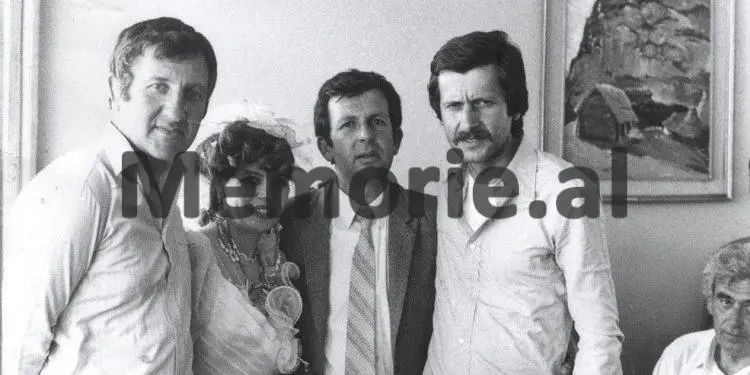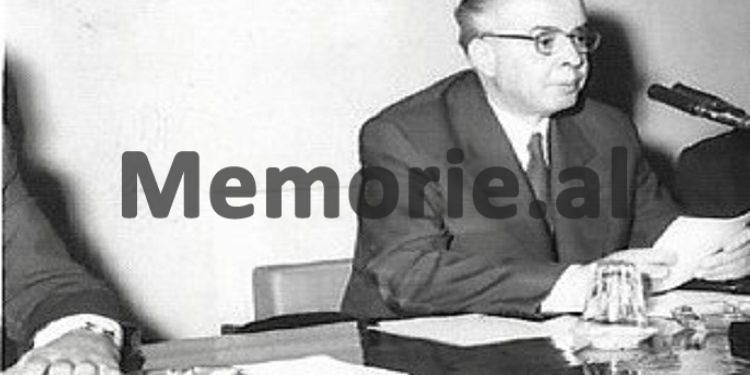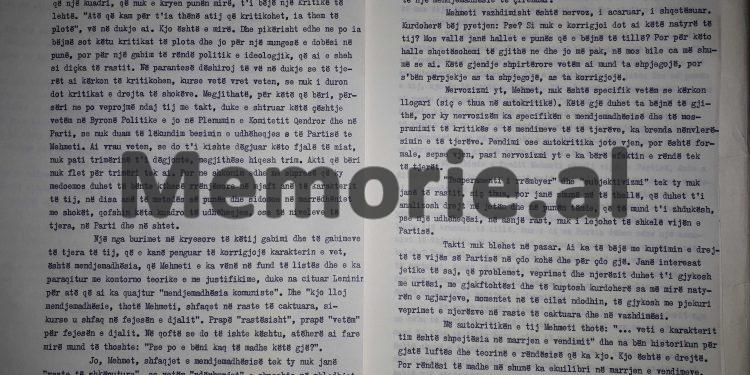Dashnor Kaloçi
Part forty-four
Memorie.al publishes some documents issued by the Central State Archive (fund of the former Central Committee of the ALP), where there is a voluminous file with archival materials which bear the logo ‘Top secret’, which belong to the period of years 1981-1982, with reports, reports, evidence, information, minutes of the meetings of the Politburo and the secretariat of the Central Committee of the ALP, etc., starting from what was held to review and analyze the self-criticism of the former Prime Minister Mehmet Shehu in December 1981, for allowing the engagement of his son, Skënder, “with a girl who had some political fugitives in her family circle”, the marathon meeting of the Politburo on the afternoon of December 17 his year that continued until the late hours of that night, where that problem was discussed with the debates and discussions of all members who “crucified” former Prime Minister Shehu, the meeting of the morning of December 18, after the news that Prime Minister Mehme t Shehu had killed himself, the marathon meeting of the Secretariat of the Central Committee of the ALP on September 20, 1982, with the topic: “Analysis of serious mistakes of Kadri Hazbiu, committed during the period when he was deputy minister and minister of Internal Affairs “, where Enver Hoxha initially launched accusations against Kadri Hazbiu, luring him as a” loyalist of the Party “, (in order for him to” open the heart of the Party “, speaking against former Prime Minister Mehmet Shehu) , where at the beginning of his speech, Enver said: “After the coup in the army, we discovered the traitorous group in economics of Abdyl Këllez, Koço Theodhos and Kiço Ngjela with friends. We also discovered this group here; it was not discovered by the State Security. The same can be said about the discovery of the group of Fadil Paçrami, Todi Lubonja and a number of other people connected with them, such as Ismail Kadareja with friends, the Security did not reveal, but that hostile work was discovered by the Committee Central, etc. ”! All these and other documents with the logo ‘Top secret’, will be published in several issues in a row, exclusively by Memorie.al.
Continued from the previous issue
Archive document ‘Top secret’ with the minutes of the meeting of the Politburo dated December 18, 1981, which took place without the presence of Prime Minister Mehmet Shehu, after a few hours ago, he was found dead in his room sleep!
ALBANIAN LABOR PARTY
CENTRAL SECRETARY COMMITTEE
-General Sector-
PROCESS – VERBAL
OF THE MEETING OF THE POLITICAL BUREAU OF THE CENTRAL AFFAIRS OF THE ALP DATES
17 E 18 DECEMBER 1981
FIFTH SESSION
COMRADE ENVER HOXHA: We open the meeting of the Politburo. Comrade Hekuran takes the floor.
COMRADE HEKURAN ISAI: I consider the incident as a consequence of some shows on which I will think to express my opinion, focusing on the shows of dualism and what I will say, existed before the event and if it was understood differently, it would was an unfair connection between cause and effect and would not really consider what happened as the cause of what we are discussing now. This would make it difficult to understand and correct.
Basically dualism, as an aspect of class struggle, appears precisely because there is waste that pushes our organism towards liberal decentralization, towards bureaucratic centralism, the abandonment and takeover of powers. For all sectors, these are fundamental problems, to which the Party forums and bodies provide solutions. There are analyzes, generalizations and relevant decisions on these problems from the levers of the Party. The role of a forum depends not only on the name, but also on the level of problems and staff that are part of it.
In connection with the problems there have been cases where proper care has not been shown. I say cases that are why I say dualism shows. From these performances, it has become a rule to say “Party and Government” out of place, because if the Government does not say so, it seems as if it denies the work of the Government. Since we say “Party and Government”, it has become a rule to put together the photo of the First Secretary of the Central Committee of the Party, with that of the Chairman of the Council of Ministers, Comrade Mehmet.
In addition, along with the main quotations, it is becoming a rule to place quotes of the Prime Minister, Comrade Mehmet, on the walls and lectures, such as discipline, Military Art, agro-technical code, the issue of power, etc. It seems to me that in addition to the main quotes, there is no need to start writing on the walls now and to mention quotes from other friends in lectures. This must be understood correctly by you, Comrade Mehmet, that if they are not understood correctly, then it can take on a different meaning. The thing is that gradually, unintentionally, situations are created that cannot be eliminated by actions, that then other problems are created.
It seems to me that it is related to what I said and the appointment of members of the Politburo as members of the Government and as party leaders, who are members of the Government, add here comrades Rita and Muho, who assist several times in the Government meeting, we become 10 members of the Bureau in these matters. What is noticed there? It is noticed that for the problematic reports that come to the Politburo for review by the Government, only three or four friends who have been at the Government meeting make remarks, proposals and suggestions.
Others, up to 10 friends either answer questions, or oppose remarks or discuss in defense, or remain silent. Thus the issue presented for discussion seems like a predetermined problem; even the number creates a dominance effect. “We are the majority of the members of the Politburo here,” said comrade Mehmet to comrade Simon Stefani, so do not stop the “X” problem.
In the Government, especially in the main sectors, there will definitely be members of the Politburo, because among the levers of the Party, the one of power is the most important sector, but will not the number be better evaluated? We have had manifestations of dualism between the state bodies themselves and specifically between the Government and the Presidency.
As the meetings of the Presidency take place today, the role of the Government has faded to some extent, sometimes not only at the level of problems, but also in the fact that the Presidency, whenever it wants, calls the members of the Government, holds them accountable until that degree, as much as anyone in the Government meeting, not only does not raise problems, but does not even raise its head. Thus the Presidency today resembles a micro government within the macro-government.
What Comrade Mehmet points out on page 6 of his self-criticism, that “the negative factors of my character, if not fought and eradicated, can lead me to other mistakes”, I do not understand that it is a question of a events analogous to what happened, I understand about the work and specifically, if Comrade Mehmet does not seriously fight against these factors, the consequence would be clear, the continuing fading of the role of the Government, the increasing concentration of power very much in the hands of the Presidency and on hearing only the voice of Comrade Mehmet.
So, in addition to the existence of selected forums, there dominates a person, comrade Mehmet, who waits for everyone’s word, shouts at everyone, insists that it go to him and, as a conclusion, we would thus have the dismissal with decisions, in work with orders. Even today, the comrades of the Presidency and the Government almost up to 15% of the time, work with orders, and let us not forget what happened to us.
After what happened to us, after what Comrade Enver said that no human being is immune, so we attach importance to education, to think and act, as Comrade Mehmet writes in his self-criticism, that he once had a sense of immunity to the influence of the enemy of the class, to the right-wing danger, it means to experience yourself by that rule set by the Party. The overestimation of oneself is concretized in the manifestations of arrogance, about which you, comrade Mehmet, could and should have spoken in the first point of self-criticism.
Arrogance, even as you treat it, as it appears to you, is born from the moment you begin to think that there are only small minds around you. The party, as an experienced cadre, has occasionally sent you to important sectors to stabilize the situation. You have worked conscientiously everywhere to carry out the tasks assigned to you by the Party. All these occasions the Party and Comrade Enver have said to you the best words you have deserved. There has never been more praise from above than you deserve.
It is not communist modesty to speak out of place “veni-vidi-vinci”, because as the work is built in our country in general, ‘beef’ is collective. The experience of Plasa has not been applied by you so far. Now, after so many years, going to you, comrade Mehmet, only a few days in Korça, it has been seen that the whole system of Government and economy works for this problem, when for the problems of Plasa, it has never worked seriously until now, although its experience is is applied today in some sectors of the economy such as Lapardha, Cakran, Dajç, Përparim, Vrinë etc.
COMRADE ENVER HOXHA: Now I will also read, as I had prepared, the criticism I had intended to make of Mehmet Shehu’s work, despite the fact that this is taking place in his absence, that he was an enemy of the Party until the moment last, until he killed himself. But the Party, as always, is strong and able to overcome all difficulties, just as it has overcome other such and great ones, so our work continues.
Friends,
The Politburo is discussing a very important issue, the big political mistake made by comrade Mehmet, approving the engagement of the boy with a girl who, in the circle of her father and mother, has 6-7 fierce enemies of power our popular, fugitives, war criminals, prisoners and internees.
Before the Party Congress, Mehmet sent me a first version of his 26-page self-critique and asked for his help. I returned this variant with the remark that we were not interested in talking at length about the history of how the error occurred, I advised him to delve into the causes of this error, which, I emphasized, are related to some concepts and attitudes not righteous, with some negative elements in his character, and that he had to understand the dangerousness of guilt and the mistakes he made.
After the Congress, Comrade Mehmet submitted to the Politburo the 39-page self-critique you read. His self-criticism does not convince me that he has deeply understood the mistake he has made. In self-criticism it extends to certain circumstances, to factors and justifications, more to justify oneself and minimize error.
Comrade Mehmet emphasizes especially in the psychological moments, moments of a great emotionality and sentimentality regarding some pathological aspects of the boy, which pushed him to make a mistake. But these are not the main and decisive reasons that led him to this mistake, but there is other, there are some aspects of Mehmet’s character, which he goes through superficially, which he calls sporadic and random, and which, by “philosophizing”, concludes that, if not corrected, they become dangerous. Exactly these performances in the character of Mehmet have become harmful and dangerous for the line and for the work of the Party. In these matters he should have delved, and in this regard, we should also help him to understand and eliminate these negative manifestations.
Politically, the Politburo is not interested in the psychological circumstances of Mehmet’s son’s engagement. She is preoccupied with the political mistake made by one of her oldest and most important members, to find out what pushed her into this mistake and what is her nature? With this engagement, Mehmeti has made a serious political-ideological mistake. He, concretizing this family-social bond, made a political-ideological alliance with class enemies. He put himself above the Party, did not question the Party leadership at all, and violated its line regarding the class struggle.
Mehmeti made the mistake full of conscience, being fully aware of whom he is linking this alliance with. Formally, he asked the Minister of Internal Affairs, Feçor Shehu, who informed him about the activity of the girl’s father, which was being processed by the State Security bodies, he also informed him about two his fugitive brothers. Feçori did not know more on the spot, but Mehmeti advised him not to involve the Security in this issue. Why? Because, in fact, he had all the data.
Fiqreti also asked him about the Pipaj family. This means that Mehmeti and Fiqreti were also aware of the family circle of the girl’s mother, which had imprisoned and escaped members, among whom, the war criminal, Myzafer Pipë, and the savage and very active reactionary, Arshi Pipë, who to this day continues to vomit bitterness from the United States of America against our popular power. Although Feçori, as a member of the Plenum and Minister of Internal Affairs, did not take a firm stand when Mehmeti asked him: “What would you do if such a case struck you in your family?”, He replied: “I will I came to ask you “, that is, I would ask the Party.
Then why did Mehmeti not reflect a little on this answer? Why did not he come to talk to me about this issue, which came from the ordinary family circle? In one place of his self-criticism, Mehmeti says: “At first I thought of widow to comrade Enver”. Why did he think of coming? When family reunions take place at the party line, there is no reason to seek approval. But he thought of coming to me, because he understood that this family connection was not in line with the Party line.
Then he tries to explain his refusal to “not bother Comrade Enver about such matters.” This does not stand. He did not come to me, not to disturb me, but he knew that I would not approve of his decision. Why did he not talk to any other friend of the Politburo, such as Comrade Kadri, who was also the Minister of Internal Affairs?
Mehmeti did so for two reasons: First that he assumed that none of his friends would approve of this marriage, and, second, that it is even more serious and the main source of his error, that he considers himself over friends. He excludes or puts himself above the discipline of the Party, which made him break its line, which is one and obligatory for all communists, without distinction, much less for a communist, whom the Party has elected to lead. Precisely to keep this line clean and to protect it from violations and distortions.
Mehmeti, not only did not consult with any of us about this marriage, but he thought of doing it “fait accompli” with an inexplicable haste. I found out about this issue indirectly, from my son, Iliri, who had been invited to Skënder’s engagement. Judging by this, even this invitation is not without its tricks. Why did my son have to attend the first acquaintance visit that Skënder’s fiancée made with his parents? That I find out indirectly? To tax my pulse or compromise me and my family in this matter? Memorie.al
The next issue follows





















